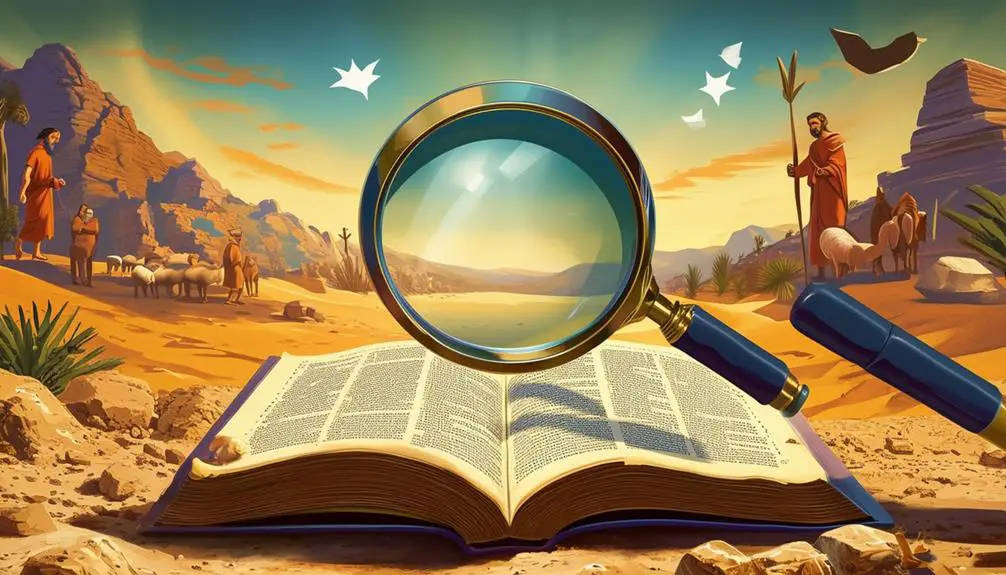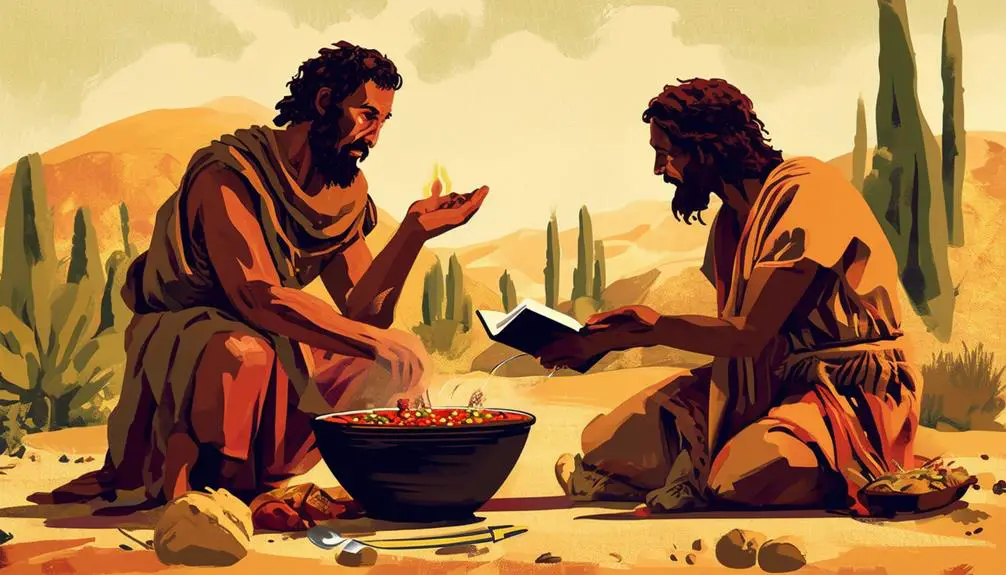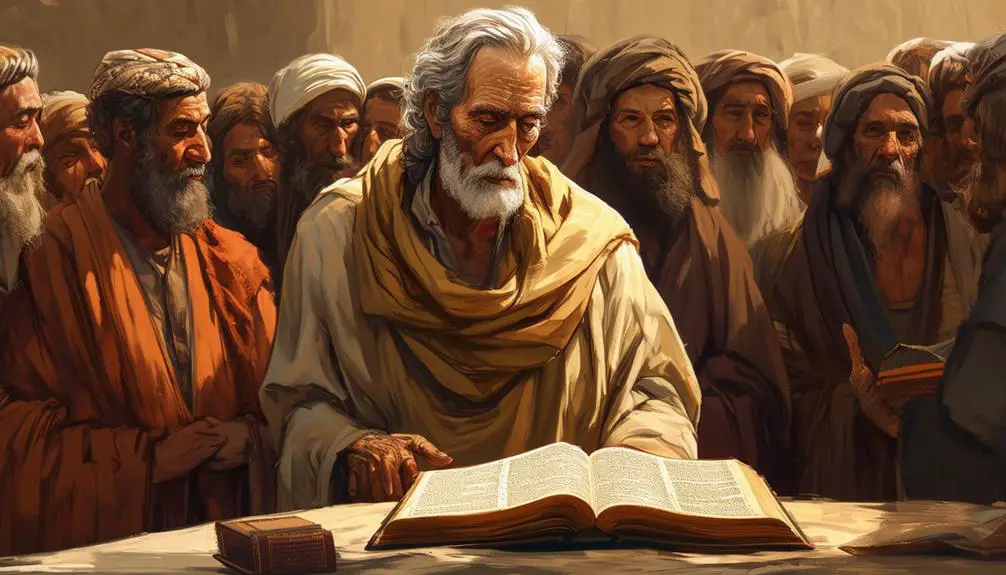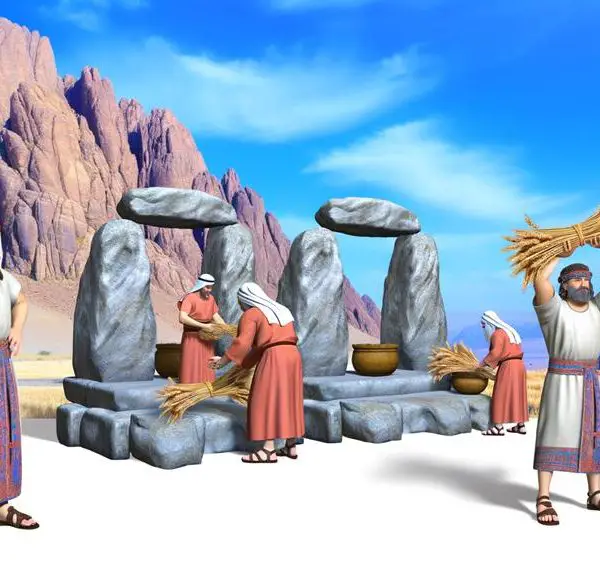Journey through Genesis Chapter 25, where decisions ripple through generations and divine intervention shapes destinies; a riveting study awaits.

Bible Study – The Book of Genesis – Chapter 25 – Summary and Analysis
In Genesis Chapter 25, the story shifts from Abraham to his descendants, including the birth of Jacob and Esau. Esau impulsively sells his valuable birthright to Jacob, underscoring the significance of imprudent decisions. The account of Ishmael's lineage is also pivotal, shaping the future of Arab tribes. As you delve deeper, you'll gain profound insights into this chapter's nuances, such as the ripple effects of familial relationships and the powerful interplay of divine intervention in human affairs. Unraveling these layers will expand your understanding of this pivotal chapter in the Book of Genesis.
Key Takeaways
- Genesis 25 marks the transition of the covenant from Abraham to his descendants, with Isaac chosen as the heir.
- The chapter recounts the birth of Jacob and Esau, with Esau despising his birthright, setting the stage for future events.
- Esau's impulsive trade of his birthright for stew signifies devaluation of blessings and consequences of impulsive decisions.
- The chapter reveals the beginning of Ishmael's lineage, the progenitors of Arab tribes, impacting theology, history, and culture.
- Genesis 25 underlines divine intervention in human affairs, the complexity of familial relationships, and the importance of wisdom and foresight.
Genesis Chapter 25: Quick Summary

Diving into Genesis Chapter 25, you'll find it's a pivotal narrative in the Bible, marking the shift from the era of Abraham, the covenant's initiator, to his progeny, setting the stage for the unfolding of God's grand design. This chapter serves as a bridge, guaranteeing the Covenant Continuity that is fundamental to understanding Genesis Interpretations.
You'll observe the death of Abraham, but not before he secures a future for his son Isaac, emphasizing the covenantal promise. Abraham's other sons, although bestowed with gifts, are sent eastward, securing Isaac's uncontested inheritance, a key element in the covenant continuity.
Next, you'll glimpse the complex genealogies of Ishmael and Abraham's other sons. These aren't mere historical records; they underscore the fulfillment of God's promise to Abraham – to father many nations. However, they also show that the covenant's blessings are uniquely Isaac's, reinforcing the selective nature of the divine promise.
Lastly, you'll encounter Isaac's marital struggles, a preface to his sons' story. Again, you'll see God's active role, emphasizing that the covenant isn't just a promise, but an active, ongoing divine engagement. These elements are pivotal in understanding Genesis interpretations, affirming the covenant's continuity, and setting the stage for the next chapter of God's grand design.
The Birth of Jacob and Esau
As we progress in Genesis Chapter 25, you'll find the birth narratives of Jacob and Esau adding another layer to this intricate biblical tapestry. Significantly, the birth of these twins is a result of Isaac's prayer to God for his barren wife, Rebekah. The response to this prayer is not only a pregnancy but also a prophecy; the older will serve the younger.
In the context of 'Jacob's Deception', it's crucial to highlight the circumstances surrounding their birth. Jacob, the second born, exits the womb grasping his brother's heel, a symbolic foreshadowing of his future usurping of Esau's birthright and blessing. His name, Jacob, meaning 'he deceives', further underlines this aspect of his character.
'Esau's Character', on the other hand, is revealed gradually. He is described as a skillful hunter, a man of the field, in contrast to Jacob who is a quiet man dwelling in tents. Esau's impulsiveness and lack of spiritual insight become evident as he despises his birthright, a detail integral to the unfolding drama of Genesis. This chapter's narrative sets the stage for the ensuing conflict and the complex interplay of divine providence and human action.
The Sale of Esau's Birthright

In the unfolding saga of Genesis 25, you'll encounter Esau's infamous trade – his birthright for a bowl of stew – a pivotal moment that sets the trajectory for the rest of the narrative. This scene highlights Esau's impulsiveness and the relative value he placed on his birthright.
Esau, the firstborn, possessed the birthright, a privilege carrying significant spiritual and material benefits. Yet, famished Esau, with little regard for its immense value, exchanges his birthright for a short-term gratification.
You'll find this scenario encapsulated in the table below:
Esau's Characteristic |
Impact on Birthright |
|---|---|
Impulsiveness |
Negatively affected the value of his birthright |
Short-term focus |
Underestimated the long-term benefits of the birthright |
Physical desire |
Prioritized immediate need over future blessing |
Disregard for spiritual matters |
Failed to appreciate the spiritual significance of the birthright |
This table succinctly represents Esau's impulsiveness and the depreciation of the birthright's value due to this trait.
Esau's sale of his birthright is a stark reminder of the potential consequences of impulsive decisions. It underscores the importance of valuing long-term blessings over immediate gratification, particularly when these blessings carry profound spiritual significance.
Analysis: Significance of Birthright Sale
To fully understand the impact of Esau's decision, it's important to explore the significance of the birthright sale within the broader context of Genesis 25. This transaction marked a turning point in the sibling rivalry between Esau and Jacob, setting the stage for a series of consequential events and conflicts to unfold.
The birthright, in ancient Hebrew culture, was a privileged status conferred upon the firstborn son, entitling him to a double portion of the family inheritance. Esau's impulsive trade of his birthright for a meal was not merely a casual exchange, but a profound forfeiture of his inheritance rights and future leadership role.
Within the narrative, this transaction underscores the theme of inheritance ethics in Genesis. It's a stark illustration of the tension between immediate desires and long-term consequences. Esau, the elder brother, is portrayed as rash and shortsighted, undervaluing his birthright's worth. Jacob, on the other hand, is portrayed as strategic and foresighted, recognizing the value of the birthright. This episode serves as a cautionary tale about the repercussions of our choices and the importance of valuing what's truly significant.
Abraham's Descendants and Death

Delving deeper into Genesis 25, you'll encounter the narrative of Abraham's descendants and his eventual death, a significant event that marked the passing of the patriarchal torch to the next generation. This chapter outlines the shift of leadership and influence from Abraham to his sons, particularly Isaac.
Abraham's faithfulness to God's commands had a profound impact on his descendants. His obedience, even in difficult situations, set a precedent for his lineage. Sarah's influence, on the other hand, is seen in the choices that her son Isaac made. Her faith and strong belief in God's promises shaped Isaac's outlook and his role as the next patriarch.
To paint a clearer picture, consider these points:
- Abraham's life ended at 175 years. His sons Isaac and Ishmael came together to bury him, symbolising a moment of unity.
- Abraham had other sons through Keturah, but Isaac was chosen as the heir.
- Abraham's faithfulness is exemplified in his obedience to God's commands.
- Sarah's influence is seen in Isaac's faith and the decisions he made.
- The transfer of wealth and blessings from Abraham to Isaac represents the passing of the patriarchal baton.
The Genesis of Ishmael's Lineage
You'll first explore the significance of Ishmael's twelve princes, analyzing their roles in the grand scheme of Genesis. Then, you'll evaluate how Ishmael's descendants shaped the narrative and contributed to the unfolding events. Finally, consider the lasting legacy of Ishmael, reflecting on the implications it carries for the broader biblical context.
Ishmael's Twelve Princes
In the heart of Genesis Chapter 25, we're introduced to Ishmael's lineage, specifically the twelve princes, who play a significant role in shaping his descendants' future. Ishmael's influence is evident in the princely leadership demonstrated by these twelve individuals.
To give you a better understanding of their significance, consider the following:
- They were the progenitors of several Arab tribes, giving Ishmael a lasting legacy.
- They embody the fulfillment of God's promise to Abraham about Ishmael fathering a great nation.
- Their leadership style was princely, setting a standard for future generations.
- They helped define the geographical and political landscape of their time.
- Each prince was a nation in himself, showing the strength of Ishmael's lineage.
The role of these princes is indeed pivotal in understanding the narrative of Genesis 25.
Ishmael's Descendants Impact
To grasp the profound impact of Ishmael's descendants, it is imperative to delve into the genesis of his lineage, a journey filled with noteworthy implications for theology, history, and culture. Ishmael's influence has played a crucial role in shaping the Arabian lineage, particularly across the monotheistic religions. As the progenitor of twelve princes, Ishmael's lineage established a multitude of tribes that spread across the Arabian Peninsula. His descendants not only influenced the social and political structures of the time but also made significant contributions to the cultural and religious fabric of the region. Hence, a thorough analysis of Ishmael's descendants' impact reveals a deep understanding of the cultural confluence and theological intersections that define the rich tapestry of the Arabian lineage.
Legacy of Ishmael
One can't overlook the profound legacy of Ishmael, whose lineage, traced back to the earliest accounts in Genesis, has shaped the course of religious and cultural narratives in the Arabian Peninsula. Ishmael's influence is undeniable, and his legacy resonates across centuries.
To truly comprehend this, consider the following:
- Ishmael's Religion, often associated with Islam, has deeply influenced the Arabian Peninsula's spiritual landscape.
- His descendants, known as Ishmaelites, were instrumental in the rise of Arab nations.
- The Bedouin tribes, believed to be Ishmael's progeny, have preserved their ancestor's nomadic lifestyle.
- The legacy of Ishmael is central to the Abrahamic faiths, signifying divine promise and blessing.
- His story is a attestation to survival, resilience, and God's providence, encapsulated in the wilderness narrative.
Ishmael's legacy is far-reaching, influencing religious, cultural, and social terrains.
Chapter 25: Key Takeaways and Reflections
What are the profound insights gleaned from Genesis Chapter 25, you may ask? This chapter presents us with a deep examination of divine intervention and familial relationships – two central themes in the overarching narrative of the Bible.
Divine intervention is evident as God intervenes in Rebecca's barrenness and provides a prophecy about her twin sons. This chapter underscores the belief that God actively participates in human affairs and shapes history according to His will.
On familial relationships, Genesis 25 offers a critical look at sibling rivalry, parental favoritism, and the consequences of hasty decisions. Esau's impulsive trade of his birthright for a bowl of stew provides a stern warning about the long-term implications of our choices.
Let's summarize these key insights in a table:
Key Takeaway |
Reflection |
|---|---|
Divine Intervention |
God is active in human affairs, directly influencing outcomes and destinies. |
Familial Relationships |
Relationships within families can be complex and fraught with tension, yet they profoundly affect individuals and their future. |
Consequences of Choices |
Impulsive decisions can have long-term consequences, underscoring the need for wisdom and foresight. |
In studying Genesis 25, you're invited to reflect on these themes and their relevance to your life.
Frequently Asked Questions
What Cultural or Historical Context Is Necessary to Understand Genesis Chapter 25?
To understand Genesis chapter 25, you'll need to grasp concepts of patriarchal succession and ancient traditions. This chapter focuses on the lineage of Abraham, so a knowledge of Middle Eastern customs and societal structures is essential. It's also influenced by ancient oral traditions. Understanding these contexts will help you decipher the complexities within this chapter and its relevance to the overall narrative.
What Is the Symbolism Behind Jacob and Esaus Birth Narrative?
Jacob and Esau's birth narrative symbolizes parental favoritism and twin rivalry. You're seeing two nations personified in these twins, born together yet destined for conflict. Jacob's holding Esau's heel signifies his desire to usurp his brother's position. Their parents' favoritism fuels their rivalry. Isaac's preference for Esau and Rebekah's for Jacob reflects the conflicts that'll define their lives. It's not just personal, it's prophetic—depicting the future of their descendants.
Are There Any Moral Lessons to Be Learned From Esaus Sale of His Birthright?
Yes, there's a valuable moral lesson in Esau's impulsive decision to sell his birthright. Like a ship tossed in the storm of hunger, he traded his birthright's immense value for a moment's satisfaction. This story warns you against making hasty decisions that can lead to regret. It encourages you to value what's truly important and not to let immediate desires cloud your judgment. Consider the long-term consequences before you act.
How Does Abrahams Death Influence the Narrative of Genesis?
Abraham's death greatly influences the Genesis narrative. His legacy and patriarchal influence shift the story's focus to his descendants, mainly Isaac and Jacob. The promises God made to Abraham are now transferred to them, creating new dynamics and conflicts. You'll see their struggles to uphold the covenant, shaping the narrative into an exploration of faithfulness and God's continual guidance, even amidst human failure. It's a profound shift in the tale.
What Is the Significance of Ishmaels Lineage in the Overall Context of Genesis?
Ishmael's lineage, like a deeply woven tapestry, plays a pivotal role in Genesis. It's the origin of Arab nations, a critical thread in the narrative fabric. Ishmael's influence isn't merely historical but also symbolic, representing resilience and survival. His descendants' growth, despite adversity, echoes throughout Genesis, creating a rich layer of complexity. Understanding this helps you fully grasp the depth and intricacies of the biblical narrative.



Sign up